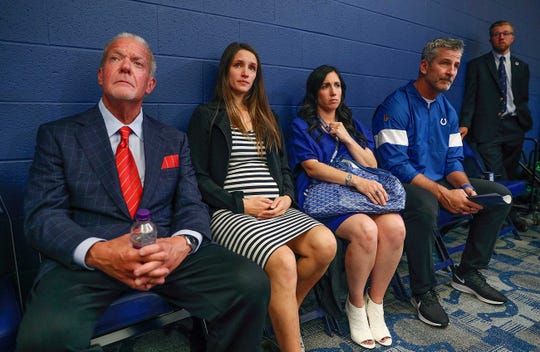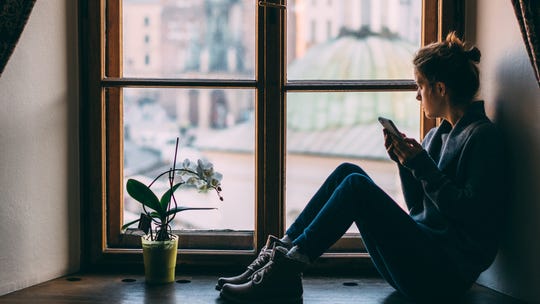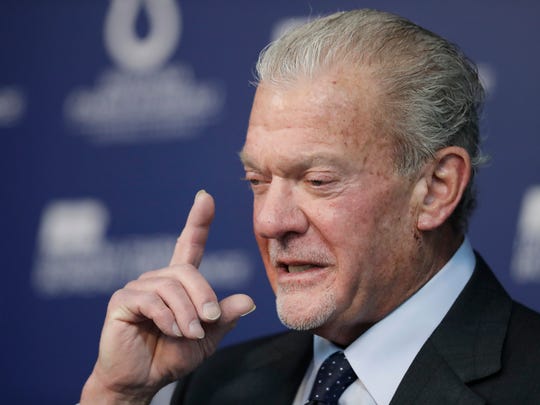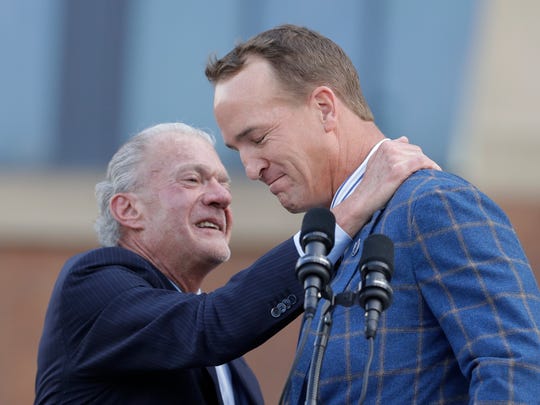
Indianapolis Colts owner Jim Irsay creates family initiative to raise awareness of mental health disorders
Mental health
As America begins to emerge from the darkest days of the pandemic, there’s little doubt many of us are emotionally battered and bruised. Those suffering from depression, anxiety or other mental illness could be on the brink of hopelessness or in full-blown crisis.
Some racked with embarrassment and shame might want to retreat into isolation or avoid reaching out for help. But now is not the time.
Because there shouldn’t be any stigma attached to mental illness. It’s a message that Americans must embrace beyond Mental Health Awareness Month.
It’s so important, particularly during pandemic recovery, that Jim Irsay, billionaire owner of the Indianapolis Colts, created a Kicking the Stigma family initiative and raised more than $4.5 million this month to help generate awareness about mental health disorders and expand treatment options and resources.
Irsay said the initiative was the brainchild of his three daughters, Carlie, Casey and Kalen. Conversations around mental health and wellness and equitable access to treatment is the first step in helping people realize they are not alone in the struggle.
Indianapolis Colts owner Jim Irsay, Luck's wife Nicole Pechanec, Kalen Irsay Jackson and head coach Frank Reich listen and watch as Andrew Luck announces his retirement following their preseason game at Lucas Oil Stadium on Saturday, Aug 24, 2019. (Photo: Matt Kryger/IndyStar)
“We’re involved in so many different aspects of charitable giving, but we wanted to really focus on one and have a legacy that we could get behind,” Irsay told me. “Particularly with the pandemic going on, mental health is really at a crisis level. It already was at a crisis level before we got into the COVID situation, but afterwards, with the isolation, with the economic hardships and those worried about self preservation, it really became apparent that is was really, really needed.”
A counter-punch to the pandemic
Irsay characterized Kicking the Stigma as a counter-punch to the pandemic, an unintended consequence that can ultimately be viewed as a positive instead of a negative. Concrete statistics on how COVID-19 affected those suffering from obsessive compulsive disorders, postpartum depression or eating disorders, for example, aren’t readily available, he said, but anecdotal evidence has shown Americans are in need of compassionate understanding.
“We don’t know the fallout effect for the next five or 10 years from the pandemic,” Irsay said. “But I can assure you it has made the ground more unsettled and led to many, many other problems.”
Celebrate Mental Health Month with these self-care products that may help relieve anxiety. (Photo: martin-dm / Getty Images)
Money from the inaugural fundraiser, which raised $2,273,449 – and was matched by Irsay – will be used to support expanded programming by Mental Health America Indiana, the National Alliance on Mental Health – Greater Indianapolis, Project Healthy Minds and Bring Change to Mind. The fund also will provide grants to Indiana-based nonprofits working in education, support and advocacy of mental health.
It’s a framework that can be used nationally, he said. Using a grant formula, nonprofit agencies that offer mental health support and services in each state could widen their safety net with the help of additional resources. “I would love to look back 100 years from now and say, ‘You know, 100 years ago, Kick the Stigma began, and now we’ve raised $2.2 trillion.'”
“We know it affects every single household, every single family; every person brushes across it in life,” Irsay said of mental illness. “These illnesses, like all illnesses such as cancer, heart disease, etc., they’re all very difficult to take on and defeat. But when you add a stigma to illnesses that are life threatening – and these are – it becomes just that more difficult.”
(Photo: The Associated Press)
Zoom, working out, a ‘holy dog’
Irsay has had his fair share of heartbreak and public battles with addiction. His grandfather and father both from alcoholism. His sister, Roberta, was killed in a 1971 car crash at 14. His only brother, Tom, was born severely mentally impaired. He died in 1999 at age 45.
Irsay became addicted to prescription drugs after he was treated for chronic hip and back pain. In 2002, he sought treatment after his name was linked to a federal and local investigation involving possible prescription drug fraud by a local plastic surgeon. In a 2010 interview with USA TODAY, Irsay openly detailed a long history of recreational drug use – including mushrooms, LSD, alcohol and cocaine – as a younger man. And in 2014, Irsay went back into rehab after he was arrested for impaired driving and found with opioids in his system.
I asked Irsay if he struggled with his own sobriety during the pandemic. He said thankfully he did not, and used the opportunity to focus on learning things like Zoom, working out and spending time with his 3-year-old dog, Drake, who he refers to as his “holy dog.” Still, being unable to see his children and grandchildren was as difficult for him as it was millions of other Americans.
The original draft of the manuscript that would become the Alcoholics Anonymous Big Book, first published in 1939 by Bill Walton and Dr. Bob Smith, is seen in Indianapolis on Wednesday, April 17, 2019. Indianapolis Colts owner Jim Irsay, who has spoken publicly of his history with addiction, purchased the manuscript at an auction last year and hopes it will be a "beacon of hope" for those in need of its roadmap to recovery. The manuscript will be on display at Fairbanks HospitalÕs annual fundraiser dinner at the Westin Indianapolis, Thursday, April 18, 2019. (Photo: Jenna Watson/IndyStar)
“I’m diligent about my recovery,” Irsay told me. “It’s like amazing grace; it comes from a higher power, and it just starts with the willingness for people to say, ‘Help me, I surrender, I can’t do it. God, you can, I’m turning my life and my will over to the care of God.'”
A hole in his soul filled with service
Irsay described a hole in his soul that can only be filled by being selfless and of service to others. He inherited a franchise football team and saw the glory of a Super Bowl win, he said there’s nothing more fulfilling in life than giving of yourself. And addressing mental illness could change the fabric of this nation.
(Photo: The Associated Press)
“It just struck a big chord with me because I know it’s been pervasive in this world, for the human race for a long time, and certainly in my family,” Irsay told me. “The worst thing with the stigma with mental health illnesses is people feel alone. And if you feel alone that’s never, never a good thing.
“So that’s really important to me, you know, not to just create legacies, but hopefully leave funding behind, that allows the legacies to grow and flourish to create a better human existence and make the world better.”
Well done, Mr. Irsay. Well done.
National columnist Suzette Hackney is a member of USA TODAY’S Editorial Board. Contact her at [email protected] or on Twitter: @suzyscribe
Source: Read Full Article




